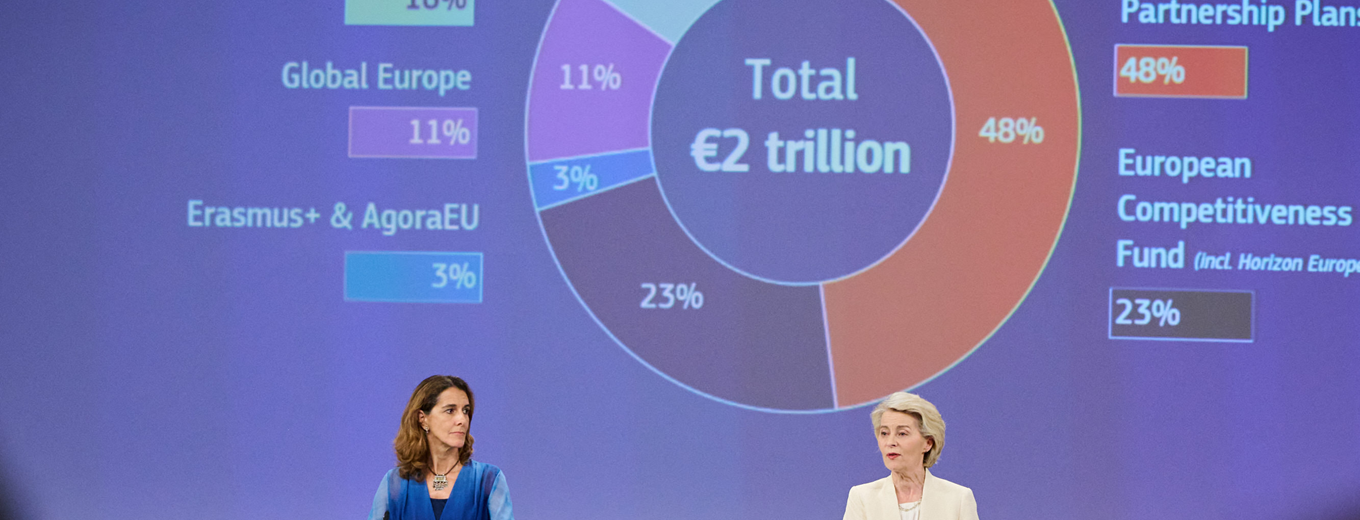The Commission set high ambitions for the next budgetary cycle and put strong programmes for research, innovation and education forward.
On 16 July 2025, the European Commission finally presented their proposals for the highly anticipated next generation of EU programmes and the next multiannual financial framework (MFF) for the period 2028 to 2034. In a press conference, Commission President Ursula von der Leyen announced high ambitions for the next MFF. The proposal amounts to a total of €1’763 trillion for the seven-year period, which is a significant increase compared to the current €1’211 trillion. However, a large part of the increase should come from so called EU ‘own sources’, which means generating EU direct income through levies and other sources. Furthermore, President von der Leyen wants to introduce much higher budgetary flexibility to be able to react to unforeseen situations and urgencies. The Commission also attempts a bold restructuring of the MFF: All existing funding pots will be divided into three main funds: i. National and Regional Partnership Plans, which include among others the cohesion, regional and agriculture funds (notably the huge CAP and Structural Funds) with almost €800 billion , ii. a new European Competitiveness Fund that brings together various EU programmes such as the European Defence Fund, Digital Europe, the Space programmes and more with almost €400 billion total and another €155 billion for Horizon Europe/FP10, iii. finally, the EU’s foreign and security policy fund “Global Europe” with €190 billion. Overall, we can observe an increase in budget for sectors and programmes linked to defence and competitiveness, and a reduction in agricultural funds.
In parallel, the Commission published its proposals for the next generation of programmes for education, research and innovation, among others. Horizon Europe and Erasmus+ will be continued as standalone programmes, in contrast to many other programmes that will be merged and bundled under the new Competitiveness Fund. The Commission suggests almost a doubling of the Horizon Europe budget and a 50% increase to the current Erasmus+ budget, reflecting their political importance. Horizon Europe will have four pillars, similar to the current structure: Pillar 1 for Excellent Science with the ERC, MSCA, and JRC; Pillar 2 for Competitiveness and Society, divided into two parts, with the former being linked to the Competitiveness Fund and the latter addressing societal challenges; Pillar 3 for Innovation with the EIC and innovation ecosystems; and Pillar 4 for the European Research Area, including Widening and the research and technology infrastructures. The link between the funding from FP10 and from the Competitiveness Fund for thematic priorities such as Health, Digital, Space & Defence and Clean Transition will be one of the particularly curious novelties to look at, as the drafts suggest some form of joint programming. In further SwissCore articles, you can find more details on bottom-up research, excellent science and dual use in FP10 (see SwissCore article) and on innovation funding in FP10 (see SwissCore article). The proposal for the next Erasmus programme continues to fund mobility and cooperation with a simplified structure. Furthermore, the European Solidary Corps (ESC) will be merged and integrated into the next Erasmus programme, returning to the previous Erasmus structure that had the European Voluntary Service (EVS) included. More details on the next Erasmus programme can be found in the synopsis (see SwissCore article).
The above mentioned Commission proposals will now be studied by the EU Member States (Council) and the European Parliament. Both institutions will prepare their positions in the autumn which will lead to the official negotiations among the three institutions likely starting next year. The negotiations on the MFF and the programmes will happen in parallel, however, the MFF has to be agreed first before the programmes can be adopted. This process could take up to two years. Given the tight budgets in the Member States, the negotiations are expected to be challenging and very likely resulting in a less ambitious MFF with lower total budgets for the programmes.
SwissCore and the whole team wish you a very pleasant summertime. The second semester 2025 will be an exceptionally exciting one as we will celebrate SwissCore’s 30th anniversary as well as Switzerland’s re-association to Horizon Europe. The Synopsis newsletter will be back for you in September.

